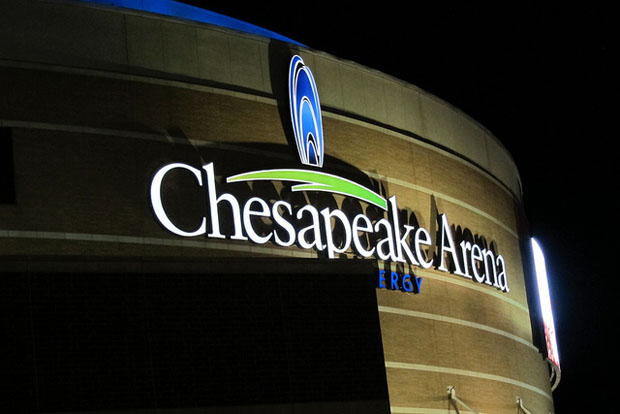
Four Things You Should Know About Chesapeake’s New Chairman and Board
-
Joe Wertz
Chesapeake Energy on Thursday named its new chairman and debuted a reworked board of directors, bowing to shareholders demanding increased oversight and a change in the Oklahoma City natural gas giant’s corporate leadership.
The shake-up — which has been expected for weeks — is important to shareholders, and the changes could impact employees and ordinary Oklahomans.
Here are four key takeaways.
1. This is a Historic Power Shift
CEO and company founder Aubrey McClendon no longer has control of the board.
The majority of Chesapeake’s reconstituted board was either selected or approved by its two largest shareholders, Southeastern Asset Management, and billionaire activist investor Carl Icahn.
Together the shareholders own more than 20 percent of the company, which both think is undervalued. But Southeastern and Icahn want Chesapeake to pay down its debt, sell assets and balance its books.
“The thing I think they need to do is limit drilling to how much cash they have available. I don’t think the company needs to take on any more debt,” new director Bob G. Alexander tells the Wall Street Journal.

ROBYN BECK / AFP/GettyImages
Fans arrive for Game 2 of the NBA Finals at the Chesapeake Energy Arena in Oklahoma City.
2. ‘Non-Core’ Assets Could be in the Crosshairs
Southeastern and Icahn also want Chesapeake to curtail spending on “non-core” assets, which includes more than $300 million in Oklahoma City real estate holdings. Chesapeake started off buying land near its OKC campus, which improved nearby neighborhoods. Now its local real estate holdings include high-end shopping centers beloved by locals.
“I think they’ve totally reshaped that whole area of town,” Roy Williams, CEO of the Greater Oklahoma City Chamber, told Bloomberg’s David Wethe. “Now, it’s a destination.”
Chesapeake also spends millions on the Oklahoma City Thunder, which McClendon owns a 19 percent stake of. And some investors — like New York City Comptroller John C. Liu, who directs NYC’s pension funds, which hold 1.9 million Chesapeake shares — have taken issue with Chesapeake directing corporate funds to McClendon’s personal investments.
Liu chided Chesapeake directors in a May 17 letter for “costly oversight failures,” including the company’s “multi-million dollar deals” with the sports team partly owned by McClendon, Bloomberg reported.
Chesapeake has defended its Thunder sponsorship and arena-naming agreement. And its investment in the team — and OKC in general — is championed by Oklahomans, business and nonprofits, and public officials throughout the state and its capital city.
But while the Thunder is sacred in Oklahoma, Chesapeake is facing a $22 billion cash shortfall. And shareholders — especially those out-of-state — might not hold the team and other such OKC investments sacrosanct.
3. The New Director is a Master Merger
Chesapeake has named a new chairman to replace CEO Aubrey McClendon, who relinquished the position after weeks of reports questioning his personal finances and investigations into his and the company’s intertwined financial relationship.
The new chairman, Archie Dunham, has the perfect pedigree to pilot the board of an Oklahoma energy company.
He’s an Oklahoma native and an ex-Marine with a bachelor’s and a master’s degree from the University of Oklahoma. Starting as an engineer, Dunham worked his way up through the ranks of Conoco, and he later served as chairman, president and CEO of the company from 1999-2002.
Steve Agee, dean of Oklahoma City University’s Meinders School of Business, said Dunham is a “dream” choice for Chesapeake, The Oklahoman reports. Bloomberg, however, reminisced about Dunham’s “management missteps”:
In 1998, Dunham incorrectly predicted that the rise to power of Hugo Chavez in Venezuela posed little threat to foreign oil explorers such as Conoco that were drilling wells in the Latin American nation’s heavy-oil belt.
That prediction proved wrong three years after his retirement, when Chavez seized the company’s assets in the country without payment, a dispute that is still being adjudicated by international arbiters.
Regardless, Dunham is considered a “master” at mergers and acquisitions, the Wall Street Journal‘s Ryan Dezember writes. Dunham orchestrated Conoco’s spinoff from DuPont in 1998 and its $15 billion merger with Phillips Petroleum in 2002. Dunham served as chairman of the newly formed ConocoPhillips from 2002-2004.
Dunham’s corporate history adds to a chorus of questions over whether Chesapeake could be bought by another energy company.
While Chesapeake aims to raise billions by selling some of its oil fields, Dunham’s appointment begs the question if a larger deal is in the offing for the debt-burdened, but asset-rich, company, the WSJ reports.
4. The New Guard … is Old
Chesapeake’s five new board members are experienced — and old.
And the age of the new board members might foretell its largest shareholders’ plans for Chesapeake in the long-term. Chairman Dunham is 73, and new board member Alexander is 78 — just two years away from the mandatory retirement age.
From the WSJ:
“If the directors are not going to stick around, it may be because the company’s looking to put itself up for sale,” Morningstar’s Mark Hanson tells Dow Jones.
Sell Chesapeake? Maybe later, new board member Alexander tells the WSJ.
“I always had the opinion, even when I had my own company, that everything’s for sale,” he said, adding that Chesapeake’s growth prospects are too good to put it up for sale in the near term.


